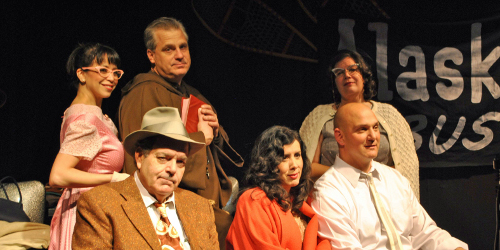By John Quinn

Asses and theater critics have less in common than artistic directors would have you believe, but if you want our cooperation, first you have to get our attention. So when guitarists Casey Hibbert and Eric Niece began strumming the gentle four chord progression that leads into the Everly Brothers' 1958 hit, "Dream," it was like the proverbial two-by-four upside the head. "Ah," I thought. "The director has set out his theme for me! I feel cooperative!"
That playwright would be Patrick Moug, company member at Ferndale's Michigan Actors Studio. Moug directs his original play, "The 59ers," with the Detroit Ensemble Theatre. It's a fictional account inspired by a real tidbit in Detroit history.
When we're barraged by the news media with "Worst recession since the Great Depression" and Detroit's official unemployment rate is above 12 percent, it's helpful to gain some perspective. The recession in Eisenhower's second term sent unemployment to 15 percent; it looked like the end of the American Dream. But there are hardy souls who can aspire to make the most improbable dream come true. Consider the "59ers," an intrepid group of Detroiters who picked up and pushed off for Alaska. The new 48th state was encouraging settlement through a homestead land grant. In the spring of 1959, they caravanned westward and settled in a remote valley on the Susitna River. But even with the best efforts, some dreams can't come true; many discouraged settlers returned to the Lower 48. Yet I was taken by a quote from Marino Sik, one 59er who stuck it out: "When I lived in Detroit, I had everything and it seemed like nothing. Here I have nothing comparatively, but it seems like everything."
Our tale starts on the battlefields of the Korean War, where "Handsome" Jack (Patrick O'Lear) gets a lot of ribbing from his buddies, Elroy (Joe Comaianni) and Anderson (Hobart Reynolds). That's as much because of his less-than-stellar looks as for his devotion to a female pen pal, Detroiter Marge Dzwienowski (Leisa Pulido). Marge and Jack intend to meet for the first time when the war is over. Jack, however, doesn't make it out of Korea; he dies in Elroy's arms. Upon mustering out, Elroy heads for Detroit, partially in search for a job, partially in search of his buddy's "friend."
Years later, a newspaper article about the Alaskan adventure helps Elroy track down Marge. It's love at first sight for our hero – so much so that he doesn't tell her he was Jack's friend. He gives up his job to accompany her. They are joined by Marge's mother (K. T. Bennett); Marge's friend Barbara Kate (Nicole Ramirez); Brother Jim, a Franciscan friar (O'Lear again); and Zeke, a newspaper reporter, also played by Hobart Reynolds. I hope I have Reynolds's characters properly named. You try taking notes in a dark theater!
But I digress. Six people in one car can lead to serious stress as personalities start to chafe. Even worse is what seven months in the wilderness can do to harmony. Can our couple's relationship survive?
I am always a tad leery when I find a playwright directing his or her own work. Theater is a collaborative phenomenon in which the participants bring balance to the production. Frequently the playwright/director is too close to his material to recognize weak spots. Thus we find some odd choices in "The 59ers." Both Elroy and Marge are very well-rounded, likeable characters and watching Comaianni and Pulido bring the roles to life is delightful. But I find that the sweet, faithful Elroy's nature is well established in the opening scenes, so two flashbacks featuring Elroy's abusive father are not really necessary. Of course, eliminate those scenes and actor Phil Hughes loses his job.
I am also puzzled by the choices of what properties are actually used versus what is mimed. There's a Roman Missal and a rosary that goes unused. There is a physical coffee urn in Act I in contrast with a mimed coffee thermos in Act II. A lot of comedy can be mined by passing a cup in a crowded car. Most peculiar, though, is a fishing scene, which includes real rods and reels but an imaginary fishing net. There actually IS a net hanging on the wall as part of the scenery, but it looks "vintage" and you simply can't let actors touch anything of value.
"The 59ers" is an ambitious project successfully staged. Both as a nod to local history and as a testament to cast-iron character, the play is satisfying entertainment.
REVIEW:
'The 59ers'
The Detroit Ensemble Theatre at Michigan Actors Studio, 648 E. Nine Mile Road, Ferndale. Friday-Sunday through Dec. 10. $18. 877-636-3320. http://www.michiganactorsstudio.com










